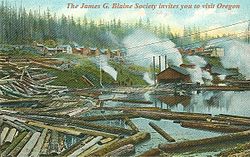James G. Blaine Society
The James G. Blaine Society is an unofficial organization dedicated to protecting the U.S. state of Oregon from overpopulation. It was founded in the early 1960s by writer Stewart Holbrook. The goal of the society is to discourage people from immigrating to Oregon. The society is named after James G. Blaine, a United States senator from Maine, because he never visited Oregon. The society has no organization, leaders, membership roster, meetings, or dues. However, the society was often mentioned in media articles about population growth in Oregon during the 1970s and 1980s.
The James G. Blaine Society was founded in the early 1960s by Stewart Holbrook, an author and journalist who wrote a regular column for The Oregonian. Holbrook wrote in a humorous blue-collar style that was very popular with readers. As a result, his career as a feature writer for The Oregonian lasted thirty-six years. Holbrook was also a well-known conservationist and advocate of sustained yield forestry. He was particularly concerned about Oregon's rapid population growth in the 1960s and the impact of unplanned development on the state's environment.
To highlight his concerns about Oregon's population growth and related issues, Holbrook created the fictional James G. Blaine Society. He highlighted its purpose in a humorous article in the 27 March 1962 edition of Look magazine, originally calling the organization the James G. Blaine Association.
The organization was named after James G. Blaine, a U.S. representative and senator from Maine and perennial presidential candidate, because the senator never visited Oregon. In fact, during his 1884 presidential campaign, Blaine visited every state in the union except Oregon. The society was named in Blaine's honor to encourage others to follow his example of avoiding Oregon.
Sharing Holbrook's concern that Oregon's rapidly growing population would have a negative impact on the state's environment, a significant number of Oregonians came to identify themselves as members of the James G. Blaine Society. Over time, the society took on a life of its own despite the fact that it had no formal organization, no leaders, no membership roster, held no meetings, and collected no dues. The society's members were self-identified and generally good natured about their isolationist views. However, the success of this tongue-in-cheek group underscored real concerns within the state for issues arising from rapid and uncontrolled population growth.
...
Wikipedia

